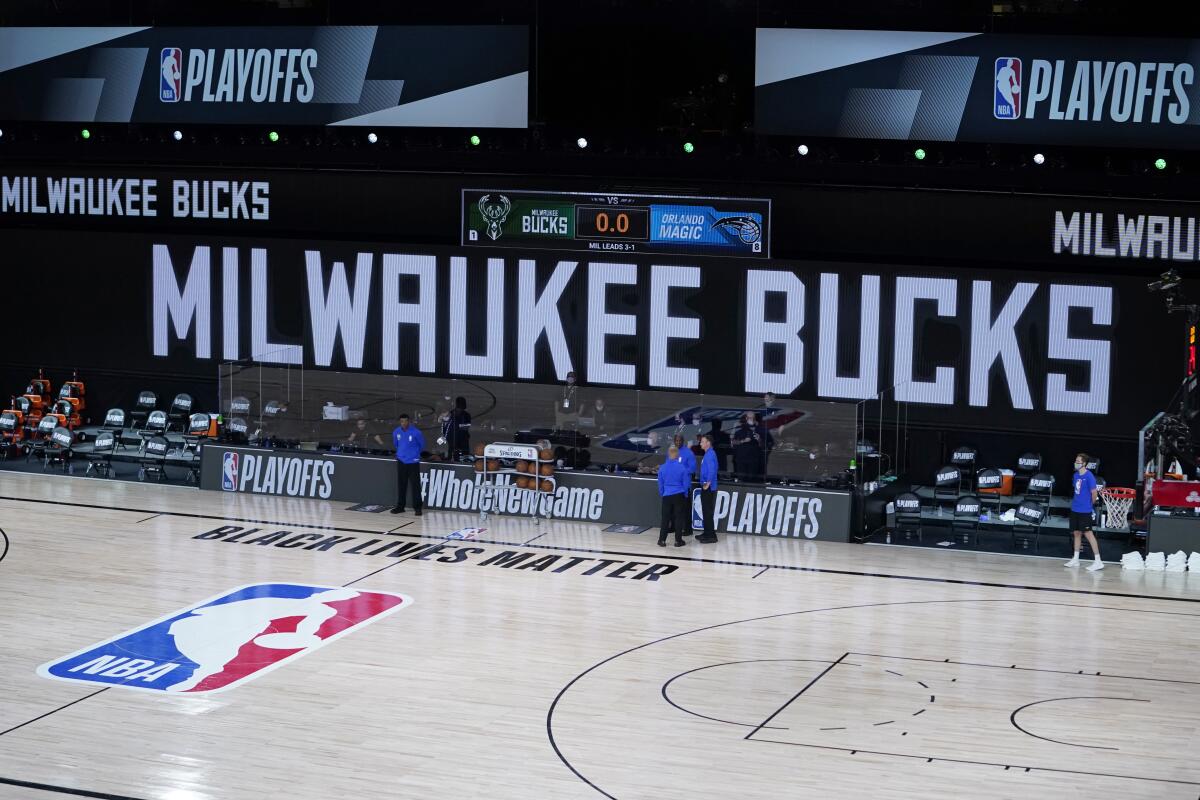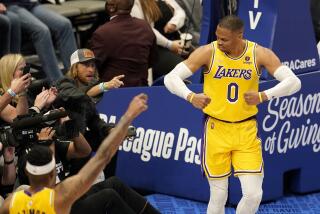Editorial: Slogans and T-shirts aren’t working. The NBA players’ strike was the most powerful message they could send

For a moment, the games stopped.
With the most sought-after prize in basketball at stake, the biggest stars of the NBA on Wednesday said they would not take the court. The Milwaukee Bucks — whose home arena is not far from Kenosha, Wis., where a young Black man, Jacob Blake, was shot multiple times in the back by a white police officer — decided they would not play. The Oklahoma City Thunder and the Houston Rockets followed suit. The Lakers and their opponent that night, the Portland Trail Blazers, refused to play as well. And shortly after, the Lakers’ LeBron James, arguably the best basketball player of his era, took to Twitter: “WE DEMAND CHANGE. SICK OF IT.”
How else to burst through the bizarre bubble in Orlando, Fla., that literally and figuratively encases the players’ lives and games these days, keeping them safe from the coronavirus but removed from real life? How else to grab fans’ attention, so lavished on their highlight dunks and three-point shots, and focus it instead on the injustice, the unrelenting violence that people of color face every day even in the midst of a so-called racial reckoning? How else to reach the masses of Americans who tune in to games but not to the problems confronting Black Americans?
This is what you have to do when wearing a T-shirt emblazoned with “Black Lives Matter” doesn’t get the message across, even when you’re famous. After the NBA stopped the playoffs, a cascade of athletes in other sports stopped playing. When the star power hitter Mookie Betts told his Los Angeles Dodgers teammates that he wasn’t going to play Wednesday against the San Francisco Giants, his teammates joined him and the game was canceled. As Dodgers manager Dave Roberts said in a press conference over Zoom: “This is a human being issue.”
Players also forced the cancellation of Major League Baseball games involving the Milwaukee Brewers, Cincinnati Reds, San Diego Padres and Seattle Mariners. Three WNBA games were suspended, as were five Major League Soccer matches. Several NFL teams canceled practices. Naomi Osaka, a top-ranked tennis player and a woman of color, temporarily withdrew from a tournament in solidarity.
And all this happened on the fourth anniversary of the day that a reporter first noticed Colin Kaepernick sitting, not standing, during the national anthem. Days later he would take a knee in protest of racial injustice. That was a lonely, costly and even dangerous decision for him to make. This time, a collective of the most influential athletes in the country, possibly the world, took a stand together to stay off courts and out of stadiums. Not since Muhammad Ali gave up his heavyweight belt in 1967 and risked going to prison for his conscientious objection to the Vietnam War have athletes made such a powerful statement. To take the platform that they command and tell not just fans but politicians and officials that injustice can no longer be tolerated is a message that can’t be ignored.
The Bucks called on the Wisconsin Legislature to reconvene. “When we take the court and represent Milwaukee and Wisconsin, we are expected to play at a high level, give maximum effort and hold each other accountable,” the Bucks’ George Hill said, reading from a statement by the players. “We hold ourselves to that standard, and in this moment we are demanding the same from lawmakers and law enforcement.”
Few Black people command the undivided attention of millions like the Black players who compose 75% of the NBA. Whether fans will understand the message behind the move or simply resent the cancellation of a hotly anticipated playoff game, that’s a risk that these players took Wednesday (and Thursday, when more teams postponed games).
Predictably, President Trump dismissed the move and accused the NBA of becoming “a political organization.” His son-in-law, Jared Kushner, the ultimate child of privilege and wealth, snidely remarked in a television interview that it was easy for wealthy players to take a night off. It may have been a night off from playing but it was hardly a night off from being Black men, or from feeling a responsibility to use their clout to try to change a society where white officers gun down people who share the players’ skin color.
Yes, there’s some anger behind this kind of protest, but there’s more anguish. His voice breaking with emotion, Clippers Coach Doc Rivers said Tuesday: “It’s amazing why we keep loving this country and this country does not love us back.” That’s a heartbreak that everyone should try to understand.
The NBA said Thursday it would resume playoff games Friday or Saturday. We wish the players could stay off the court until all law enforcement officers acted as if Black lives mattered, or at least until sports fans across the country recognized the problem of systemic racism and took it upon themselves to solve it. But, then, who knows when the NBA would ever play again.
More to Read
A cure for the common opinion
Get thought-provoking perspectives with our weekly newsletter.
You may occasionally receive promotional content from the Los Angeles Times.










